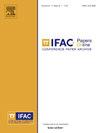Towards Automated Model Order Reduction and Feedback Control for Nonlinear Finite Element Models⁎
Q3 Engineering
引用次数: 0
Abstract
Spanning applications from microsystems to passenger jets, finite element (FE) models play a crucial role in the design of a wide range of technical products. However, such models are not suited for applications at system-level or in control due to their large scale. While several schemes to obtain models and controllers based on FE models exist, they either require high-level access to the FE software, create black-box models without physical interpretation, or require specialist knowledge. This paper outlines a workflow to generate highly efficient models and appropriate controllers for nonlinear FE models at the push of a button. In a first step, model order reduction via proper orthogonal decomposition creates an accurate surrogate model of drastically smaller dimension. Nonlinearities are handled via the trajectory piecewise linear approximation (TPWL), maximizing compatibility with commercial FE software by exclusively relying on data produced by regular solutions. Complementing TPWL, gain-scheduling is deployed to establish a precise controller. The proposed workflow is demonstrated for a tunable prism, showcasing its efficacy.
实现非线性有限元模型的自动模型阶次缩减和反馈控制⁎
从微系统到客机,有限元(FE)模型在许多技术产品的设计中起着至关重要的作用。然而,这种模型不适合系统级的应用程序或控制中的应用程序,因为它们的规模很大。虽然存在几种基于有限元模型获得模型和控制器的方案,但它们要么需要对有限元软件的高级访问,要么需要在没有物理解释的情况下创建黑盒模型,要么需要专业知识。本文概述了一个工作流程,以产生高效的模型和适当的控制器的非线性有限元模型按下一个按钮。在第一步中,通过适当的正交分解来降低模型的阶数,可以创建一个精确的小维代理模型。非线性是通过轨迹分段线性近似(TPWL)处理的,通过完全依赖于常规解产生的数据,最大限度地提高了与商业有限元软件的兼容性。作为TPWL的补充,利用增益调度来建立精确的控制器。提出了一个可调棱镜的工作流程,展示了其有效性。
本文章由计算机程序翻译,如有差异,请以英文原文为准。
求助全文
约1分钟内获得全文
求助全文
来源期刊

IFAC-PapersOnLine
Engineering-Control and Systems Engineering
CiteScore
1.70
自引率
0.00%
发文量
1122
期刊介绍:
All papers from IFAC meetings are published, in partnership with Elsevier, the IFAC Publisher, in theIFAC-PapersOnLine proceedings series hosted at the ScienceDirect web service. This series includes papers previously published in the IFAC website.The main features of the IFAC-PapersOnLine series are: -Online archive including papers from IFAC Symposia, Congresses, Conferences, and most Workshops. -All papers accepted at the meeting are published in PDF format - searchable and citable. -All papers published on the web site can be cited using the IFAC PapersOnLine ISSN and the individual paper DOI (Digital Object Identifier). The site is Open Access in nature - no charge is made to individuals for reading or downloading. Copyright of all papers belongs to IFAC and must be referenced if derivative journal papers are produced from the conference papers. All papers published in IFAC-PapersOnLine have undergone a peer review selection process according to the IFAC rules.
 求助内容:
求助内容: 应助结果提醒方式:
应助结果提醒方式:


